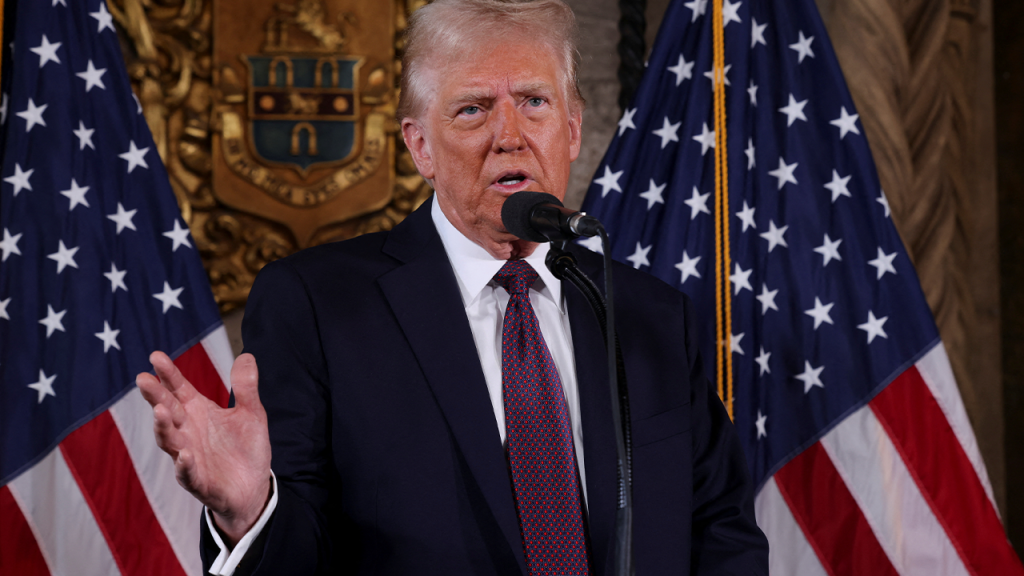President-elect Donald Trump’s surprise announcement to rename the Gulf of Mexico to the “Gulf of America” has ignited a flurry of discussion and speculation. Delivered during his first press conference since Congress certified his electoral victory, the declaration follows a series of pronouncements highlighting Trump’s unconventional approach to foreign policy and territorial ambitions. The proposed name change, described by Trump as possessing a “beautiful ring,” underscores his focus on reasserting American dominance and reshaping the geopolitical landscape. While the specifics of how this renaming would be achieved remain unclear, the announcement reflects a broader pattern in Trump’s rhetoric and actions concerning international relations, particularly those involving neighboring countries.
The context of the announcement is noteworthy. Trump’s press conference, held at his Mar-a-Lago resort, was primarily focused on economic matters, including a $20 billion investment commitment from DAMAC Properties for new data centers across the United States. This significant economic development announcement, intended to highlight the positive impact of his impending presidency, served as a backdrop for the unexpected unveiling of the Gulf of Mexico renaming initiative. The juxtaposition of economic prosperity and a bold geopolitical move aimed to project American strength characterized the tone of the press conference.
However, the “Gulf of America” proposal was quickly overshadowed by Trump’s criticism of Mexico’s handling of immigration. He accused Mexico of allowing “millions of people to pour into our country” and threatened to impose “very serious tariffs” on both Mexico and Canada. Trump’s immigration concerns have been a central theme throughout his political career, and his post-election pronouncements reaffirm his commitment to addressing border security and tightening immigration policies. The linkage of the Gulf of Mexico renaming with criticism of neighboring countries adds a layer of complexity to the proposal, raising questions about its underlying motivations and potential implications for international relations.
Trump’s fascination with territorial expansion and renaming is not limited to the Gulf of Mexico. His prior references to Canada as the “51st state” and his expressed interest in acquiring Greenland, an autonomous territory under the Kingdom of Denmark, showcase a recurring theme of expanding American influence and control over strategically important regions. Donald Trump Jr.’s recent trip to Greenland, ostensibly for recreational purposes, fueled further speculation about the Trump administration’s interest in acquiring the territory. While the stated purpose of the trip was to create video content, it inevitably drew attention given Trump’s previous statements about Greenland.
The “Gulf of America” renaming proposal, while seemingly abrupt and unconventional, fits within a larger pattern of Trump’s assertive approach to international relations and his desire to project American power on a global scale. His rhetoric and actions regarding neighboring countries, coupled with his interest in territorial expansion, suggest a desire to reshape the geopolitical landscape according to his vision of American dominance. While the practical implications and feasibility of renaming the Gulf of Mexico remain uncertain, the announcement itself serves as a symbolic gesture reflecting Trump’s broader geopolitical ambitions.
It’s crucial to note the diverse reactions to this announcement. While some may view it as a bold assertion of American influence, others may interpret it as a provocative move with the potential to strain international relations. The long-term implications of such a renaming, including its impact on international agreements, maritime boundaries, and diplomatic relations, require careful consideration. Furthermore, the lack of detailed plans for implementing the name change adds to the uncertainty surrounding the proposal. Whether the “Gulf of America” ever becomes a reality remains to be seen, but the announcement undoubtedly reflects Trump’s distinctive approach to foreign policy and his determination to reshape the global stage.

